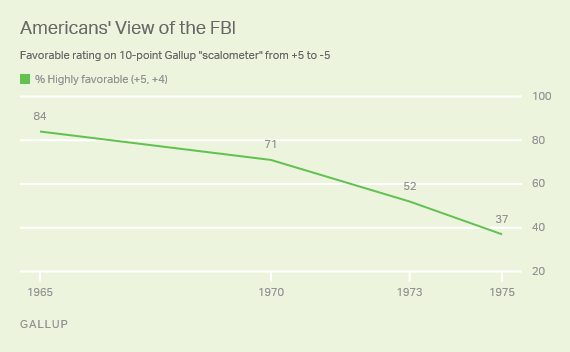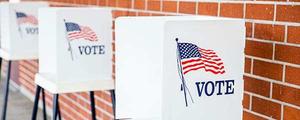The FBI experienced a fall from grace in Americans' eyes in 1975, after a U.S. Senate committee's revelations about the nation's top law enforcement agency. Thirty-seven percent of Americans had a "highly favorable" view of the FBI that year, down from 84% in 1965.

This steep decline in support for the FBI was a result of disturbing revelations, as outlined in a news release by George Gallup:
"The FBI has been under heavy fire in recent months, most recently as a result of an investigation by the Senate Intelligence Committee which concluded that for six years prior to his death in 1968, the Rev. Martin Luther King Jr., was harassed by the FBI in an apparent attempt to destroy his effectiveness as a leader of the civil rights movement."
Gallup also noted, however, that the FBI enjoyed a good reputation historically. In surveys dating back to the 1930s, Americans held longtime FBI Director J. Edgar Hoover in high esteem, along with the institution itself. To wit, in 1965 three out of four Americans said they would be pleased if they had a son who had decided to become an FBI agent.
The Senate Intelligence Committee, popularly known as the Church Committee after U.S. Senator Frank Church (D-ID), was part of a broader effort to investigate the FBI in 1975, along with the CIA, the NSA and the IRS. In 1976, the committee concluded that these agencies committed numerous intelligence abuses, leading to Congress approving legislation in 1978 to enable checks and balances for these agencies in question. The Foreign Intelligence Surveillance Act (FISA) was one such reform, requiring the executive branch to request warrants for wiretapping and surveillance purposes from a brand new FISA Court.
Despite the plummeting of its highly favorable rating in the early 1970s, the FBI maintained a generally positive image, including an overall 81% favorable rating in 1975. While Gallup has not updated this measure in recent years, a 2014 Gallup survey of how government agencies are doing found the FBI ranked second, only behind the U.S. Postal Service.
These data can be found in Gallup Analytics.
Read more from the Gallup Vault.



